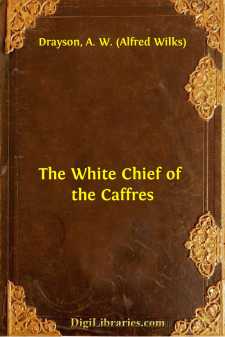Categories
- Antiques & Collectibles 13
- Architecture 36
- Art 48
- Bibles 22
- Biography & Autobiography 813
- Body, Mind & Spirit 142
- Business & Economics 28
- Children's Books 15
- Children's Fiction 12
- Computers 4
- Cooking 94
- Crafts & Hobbies 4
- Drama 346
- Education 46
- Family & Relationships 57
- Fiction 11828
- Games 19
- Gardening 17
- Health & Fitness 34
- History 1377
- House & Home 1
- Humor 147
- Juvenile Fiction 1873
- Juvenile Nonfiction 202
- Language Arts & Disciplines 88
- Law 16
- Literary Collections 686
- Literary Criticism 179
- Mathematics 13
- Medical 41
- Music 40
- Nature 179
- Non-Classifiable 1768
- Performing Arts 7
- Periodicals 1453
- Philosophy 64
- Photography 2
- Poetry 896
- Political Science 203
- Psychology 42
- Reference 154
- Religion 513
- Science 126
- Self-Help 84
- Social Science 81
- Sports & Recreation 34
- Study Aids 3
- Technology & Engineering 59
- Transportation 23
- Travel 463
- True Crime 29
The White Chief of the Caffres
Description:
Excerpt
Chapter One.
I was born in the city of Delhi, in Central India, where my father held a command as major in the old East India Company’s service. I was an only son, and my mother died shortly after I was born. I resided at Delhi until I was ten years of age. Having been attended as a child by an ayah, and afterwards taught to ride by one of my father’s syces, I learned to speak Hindostani before I could speak English, and felt quite at home amongst black people.
My father, Major Peterson, had a brother in England who was a bachelor, and an East Indian merchant, and supposed to be very rich. I was named Julius, after this uncle, who was my godfather, and who was much older than was my father, and who, although he had never seen me, yet took great interest in me, and mentioned me in all his letters.
It was just before my tenth birthday that my father received a letter from my uncle, which caused a great change in my life, and led to those adventures which I relate in this tale. In this letter my uncle wrote, that from his experience of India he was certain that I could not be properly educated in that country; that at my age the climate was very trying; and that consequently he wished my father to send me home, in order that I might be placed at a good school in England, and eventually sent either to Addiscombe or Haileybury, according as I chose the military or civil service of India. The expenses of my education, my uncle stated, would be undertaken by him, so that money need not interfere with the question. Young as I was I saw the advantages of this proposition, and being by nature ambitious and fond of adventure, I was pleased at the prospect of seeing England. After a little hesitation my father consented to part with me, and I and my father commenced our long journey from Delhi to Calcutta. In those early days of my youth there were no railways in India; there was no Suez Canal, and there were no steamers in the world. To reach England we embarked at Calcutta in what was termed one of Green’s ships—that is, a fine East Indiaman, a full-rigged ship of about 1,000 tons—and having sailed down the Hoogly river, commenced our four months’ voyage, round the Cape, and from thence by Saint Helena to England.
I can remember Delhi as it was in those days—its fine old fort, the fortifications round the town, its long street, in which were the bazaars and jewellers’ shops. Many of the little native children to whom I used to talk in my childhood were probably among those who, during the Mutiny, were the murderers of my countrymen. Localities on which I have sat with my ayah, and took my first steps, have since then become famous as the places where our soldiers have fought and conquered against overwhelming numbers. Though I have passed through many strange scenes, I still remember Delhi, for it was my birthplace, and it has ever had a charm for me on that account only.
After a journey of nearly a month we reached Calcutta, and were received as guests by a friend who lived in Fort William....



